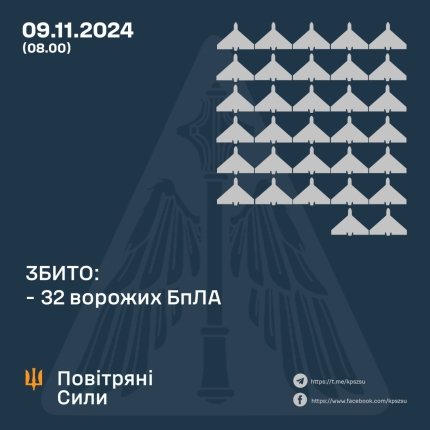On the night of November 8-9, Russian invaders again attacked peaceful Ukrainian towns and villages with a large number of attack drones. Most of them did not reach their goals.
Points of attention
- Ten enemy UAVs were lost in location.
- The epicenter of the attack was the Odesa region.
- As a result of the attack, residential complexes, the private sector and administrative buildings were damaged in Odesa, but civilians were not injured.
The Russian attack on Ukraine on November 9 — the first details
According to the Air Force of the Ukrainian Armed Forces, a new enemy attack began at 21:00 on November 8.
It is indicated that the Russian army attacked from the Primorsko-Akhtarsk and Oryol districts of the Russian Federation, using the 51st strike UAV of the "Shahed" type and unmanned aerial vehicles of an unspecified type.
It is important to understand that the Odesa region became the new epicenter of the attack.
Anti-aircraft missile forces, electronic warfare units, mobile fire groups of the Air Force and the Defense Forces of Ukraine were involved in destroying enemy targets.
As of 08:00, the downing of 32 enemy UAVs in the Odesa, Mykolaiv, Dnipropetrovsk, Zaporizhzhya, Donetsk, Sumy, Kharkiv, Poltava, Vinnytsia, Cherkasy and Ternopil regions has been confirmed, the Air Force of the Armed Forces of Ukraine reports.
In addition, it is emphasized that another 18 Russian drones have been lost in various regions of Ukraine.

Consequences of Russia's attack on Odesa on November 9
In the city, high-rise buildings, the private sector, administrative premises and transport fell under a new enemy attack.
According to the latest data, none of the civilians were killed or injured.
In addition, it is emphasized that electricity has disappeared in a part of Odesa.
The Odesa City Council reported that as a result of the Russian attack, several high-rise buildings and houses in the private sector were damaged, as well as administrative buildings, warehouses and cars in one of Odessa's districts.
According to V. at. Oleksandr Filatov, the mayor of Odesa, this was already the third consecutive attack by "Shakheds". The wreckage of the drone damaged the residential complex, but no one was injured.









